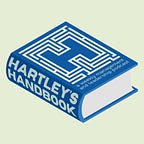The first episode of Hartley’s Handbook, but in podcast form! I’ll be adding some new features along the way, but for now, enjoy! You may also see several of these this week.
Automated Summary (full transcript available in the transcript tab):
Welcome to Hartley's Handbook, the essential podcast for leaders eager to sharpen their management edge. I'm John Hartley—Hartley to most—and every week we'll slice through the buzzwords and get down to business with concrete strategies and actionable insights designed to elevate your leadership game.
Ditch the fluff; this is about real-world solutions that you can put into practice now. Whether it’s crafting a dynamic team or honing your own approach, we’ve got you covered. No empty platitudes here—just straight talk that’ll help you thrive in any managerial landscape, though I often skew toward software engineering management principles.
Thanks for joining me as we kick off episode one. If you’re craving growth and improvement in your craft, let’s dive right into some foundational reads for managers across all sectors—not just engineering—a topic from an article of mine which resonated with many readers: "Nine Books All Engineering Managers Should Read." Despite its age, more titles have joined those ranks worthy of attention.
I’m always on the hunt for new knowledge sources—reference books are personal favorites because they offer targeted advice when grappling with specific scenarios like performance reviews or OKRs—the book “Scaling People” by Claire Hughes Johnson being a prime example. Reference works like these are invaluable tools at your disposal.
Next up is “Execution: The Discipline of Getting Things Done” by Lawrence Bossidy and Ram Charan—an indispensable guide focused on project completion within organizations. It emphasizes defining what 'done' means contextually—is 40% enough? Or do projects need an 80% completion rate? This resource provides clarity around execution standards while delivering practical tactics aimed at enhancing productivity summed up perfectly by this principle: Spend less time talking and more time doing.
Then there's Lara Hogan’s concise yet profound offering "Resilient Management," which delves into effective communication techniques throughout different stages of team development based on Tuckman's well-known model (forming-storming-norming-performing). Notably short but loaded with valuable tips—it should be mandatory reading for anyone stepping into a managerial role.
Roy Osherove's "Elastic Leadership" encourages embracing discomfort as part of leadership growth—a thought-provoking read packed with challenging questions about leading teams effectively under various circumstances.
For something rooted deeply in understanding engineers’ psyche turn towards Gerald M. Weinberg’s classic tome “The Psychology of Computer Programming.” Although some sections may feel outdated (like Fortran), its exploration into programmer behaviors remains enlightening today.
Another gem is “The Toyota Way,” renowned not only for introducing efficiency models such as Andon but also emphasizing continuous learning—a theme echoed throughout our conversation today.
For navigating middle management challenges Scott Mautz’ "Leading from the Middle" stands out particularly during times where influence feels limited; it presents clear pathways forward without sugarcoating realities faced daily in such roles.
If motivation science intrigues you Islet Fishbach offers empirical-backed approaches in her work “Get It Done”—a compilation encompassing motivational frameworks fit especially well within project-oriented environments demanding high engagement levels despite mixed reception among critics.
Finally, Tony Fadell shares his wealth of experience managing innovative projects in his book Build: An Unorthodox Guide Making Things Worth Making. He highlights key aspects of ending projects appropriately ensuring lessons carry over future endeavors product mindset versus ticket-taker mentality.
That wraps Episode One thanks tuning until next time keep evolving leader!





